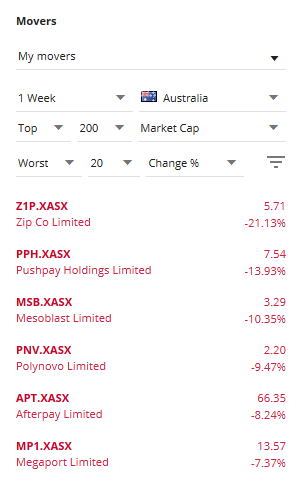Trading with Focus – HELLPPP! My stocks stopped going up!!!

Pic: Stevica Mrdja / EyeEm / EyeEm via Getty Images
Calm down. Let’s start with a full recap about what you know, where you got yourself into trouble and what to do next.
First, it’s important to remember the basic function of the stock market – a regulated exchange where companies can go to create a market for their shares and get access to capital.

In that market people can invest or sell out of said companies (and reinvest in other ones if need be).
There is a theoretical ‘risk-return trade-off’, where, in theory, the potential returns on riskier investments are higher. Or they should be, according to Efficient Market Theory.
There is also a thing called a Discounted Cash Flow (DCF) model; you take the expected cashflows that will come from an investment, and you reduce the value of that cashflow by ‘time’ (a dollar now’s better than a dollar later).
You also reduce it by ‘likelihood’ or risk, compared to what you could make from the ‘least risky’ asset that you could invest in. To see if it’s worth it (or something like that).
In the simplest example I can think of, your typical Mum is more than likely to pay out the money she owes you than your sister’s deadbeat boyfriend.
So, if you are calculating the amount of interest payable (or the ‘Vig’, if you are an old timey mobster) Mum gets the better rate…right?
But maybe in this scenario you also did a bit of research into Mum and the Deadbeat. Mum’s job is pretty secure but there’s no real upside to you – you’ll get your money back and still have to wait until Xmas for a BMX.
BUT the Deadbeat is talking about cutting you in on a van-based distribution network of ‘medicinal’ products servicing the emo kids at the skate park.
And you’ll be swimming in cash before you know it (possibly with some sort of shareholder benefits program too?). He seems like a winner…your sister wouldn’t date him otherwise – right?
Mum has been in her role for a long time and is always ‘good for it’ when giving back cash. Deadbeat has been a long-term consumer of his product, but never a distributor, although he definitely knows the industry.
He’s not yet made a profit, so he’s always needing to borrow it or take on ‘investors’. But that’s ‘The Game’ nowadays and he is planning to scale, then start looking to diversify when he gets an ‘in’ with the local bikie gang.
Deadbeat could hit it rich, the other ‘distributors’ certainly have VERY NICE BMX’s and you want one NOW, not at Xmas. There’s a lot more kids at the skate park now, and everyone’s talking about it on chat forums.
So you invested with DB (who’s now your sisters ex-boyfriend), and now you’re worried that you’re not getting your money back.
You did your research, you ran some discount cashflow numbers, you compared the available investments to find the best potential value.
You considered the risks, and only then, you took that calculated risk. But it’s not going up anymore.
(You definitely didn’t draw down on your super and put it all in a BNPL stock just because they were going up; that would be crazy!)
Now what.
Well, its time for some soul searching.

Here’s a few questions to ask yourself:
- How much money is this company making currently?
- If none, when will it make money and how certain are you of that?
- If it is, say, in consumer finance, what other companies are already making profits that could be deemed as lower risk?
- In terms of the similar company that is making money, how much is the price of each share of that stock, and how much of that profit would each share be entitled to – and what is that ratio, of the price to the earnings? Is it above or below the average of the market? Do ya reckon that’s justified? (Wait, what…they’d have to make HOW MUCH?!?!)
- Do you use the products, and are they truly revolutionary, like inventing Google? Or is it just a fad-ish product rebadged as something else — like say, normal lending or lay buy?
- Are there other competitors? Many? Is there room for all of them?
- Has their share price already grown rapidly, like, say, a bubble? Or are they making crazy amounts of money now, more than they were like 6 months ago?
- Does everyone and everything always achieve everything they say they are going to, or are you hoping, or ‘speculating’ that they definitely will make a billion (or two) dollars a year in profit at least! Based on…gut feel? Some other guy that has doubled his money on them?
If your answer to this is “don’t know don’t care, it’s just cheaper now I’ll buy more, shut-up Boomer the world has changed and you don’t understand new investing”, well, you are gOiNg To Do JuSt FiNe!
(NB: No you’re not.)
If you want to be a better trader and not just a gambler, you’ll need to understand that successful trading is work.
You’ll also need good resources and tools to do it, and if you’re keen to learn from each trade (good or bad) then you could be on the right track.
So, you ask, what to do with the ones you already bought that aren’t going well?
Toss a coin, if that’s how you got here. Or read the markets, read about the markets, read the crowd and don’t blindly follow the crowd. Learn what a bubble looks like, what drives it to crazy-town and then turn up earlier next time. Or put in a stop loss. Did you really jump into the deep end of the pool with no lessons?
And start asking yourself if your trading platform is good enough for you, or if you just use it because someone told you to?
Don’t listen to anyone in the stock market without checking their facts and make your own mind up.
Isn’t that how you got into this trouble in the first place?!?
Trade Up to Marketech Focus — a high-function trading platform from $45 per month. Instant trading capability for both PC and mobile to keep you on the move.
As a subscriber you will have access to brokerage starting at $5, and then 0.02 per cent for trades over $25k. Go to www.marketech.com.au to set up a free trial.
This article was developed in collaboration with Marketech Stockbroking Pty Ltd (AFSL 486148), a Stockhead advertiser at the time of publishing. This article does not constitute financial product advice. You should consider obtaining independent advice before making any financial decisions.
UNLOCK INSIGHTS
Discover the untold stories of emerging ASX stocks.
Daily news and expert analysis, it's free to subscribe.
By proceeding, you confirm you understand that we handle personal information in accordance with our Privacy Policy.








